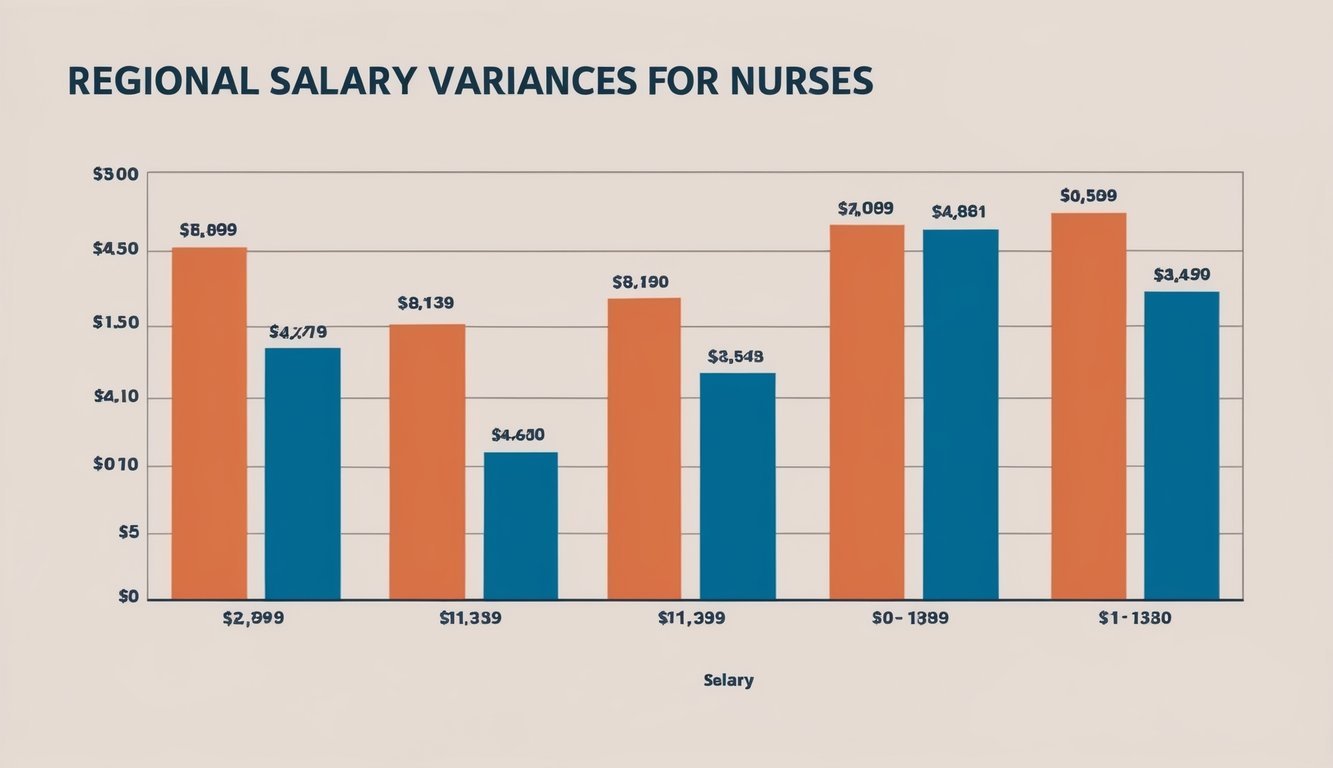Operating room nurses play a crucial role in the healthcare system.
As an OR nurse, you can earn a wide range of salaries based on your location, experience, and level of specialization.
Understanding these factors is essential for making informed decisions about your career in nursing.
Many aspiring nurses may wonder what they can expect in terms of salary.
The average OR nurse salary can range widely, reflecting both regional differences and the demand for skilled professionals in different areas.
With opportunities for advancement and specialization, many find that their earning potential increases over time.
Gaining insight into OR nursing salaries is not just about numbers—it’s about understanding the possibilities that come with this rewarding career.
You’ll uncover how regional variances affect pay and the outlook for job opportunities in this dynamic field.
Key Takeaways
- The salary for OR nurses can vary based on location and experience.
- Advancing your education may lead to higher pay and more job opportunities.
- The demand for skilled OR nurses is expected to grow, enhancing career prospects.
Overview of OR Nursing
Working in the operating room (OR) is a vital role in healthcare.
You will understand the responsibilities and qualifications needed to excel in this specialized nursing field.
The Role of an OR Nurse
As an OR nurse, often called a perioperative nurse, you play a critical part in surgical teams.
Your main duties include preparing the operating room, ensuring all equipment is sterile and ready, and assisting surgeons during procedures.
You act as a patient advocate, monitoring vital signs and providing emotional support.
You also collaborate closely with anesthesiologists, surgical technologists, and surgeons.
The ability to think quickly is essential since unexpected situations can arise in the OR.
You are trained to respond effectively, ensuring patient safety.
Essential Qualifications and Education
To become an OR nurse, you typically need a Bachelor of Science in Nursing (BSN).
This nursing degree gives you a solid foundation in nursing practice.
Following your degree, passing the NCLEX-RN exam is required to become a registered nurse (RN).
After obtaining your RN license, gaining experience in a clinical setting is crucial.
Many OR nurses pursue additional certifications, such as Certified Nurse Operating Room (CNOR).
This advanced certification demonstrates your expertise in perioperative nursing and can enhance your career opportunities.
| Education Pathway | Description |
|---|---|
| Bachelor of Science in Nursing | 4-year degree focusing on nursing theory and practice. |
| NCLEX-RN Exam | Required exam to obtain RN license. |
| Additional Certifications | CNOR or related certifications for specialization. |
OR Nurse Salary Statistics

Understanding OR nurse salaries is important for those considering this career path.
Salaries vary based on factors like location, experience, and education level.
Let’s look at how these elements influence earnings and compare the salaries across different states.
Factors Affecting OR Nurse Salaries
Several factors can impact your salary as an OR nurse.
These include experience, education, and geographic location.
Nurses with advanced degrees, such as a Bachelor of Science in Nursing (BSN), tend to earn higher salaries.
Also, your years of experience play a vital role.
Entry-level OR nurses typically earn less than those with several years in the field.
Lastly, location can cause significant variations.
States like California and Massachusetts often offer higher salaries compared to states like Texas or Florida.
According to the U.S. Bureau of Labor Statistics, the average annual salary for registered nurses, including OR nurses, was approximately $86,070 in 2023.
Comparative Analysis of OR Nurse Salaries
Comparing OR nurse salaries across different locations can help you make informed decisions about where to work.
Here’s a concise look at average salaries in select states:
| State | Average Annual Salary |
|---|---|
| California | $113,240 |
| New York | $109,200 |
| Texas | $77,840 |
| Florida | $69,890 |
| Ohio | $75,600 |
As shown, states with high living costs typically offer higher salaries.
In addition, specialty areas within nursing can also affect pay.
Specialized OR nurses often earn more due to their advanced skills and responsibilities.
Regularly reviewing resources like Nurse.org can keep you updated on salary trends in the nursing field.
Regional Salary Variances

Nurse salaries can vary widely across different regions.
Understanding these differences is essential for making informed career decisions.
Factors like state salaries and cost of living can significantly impact your overall earnings.
Highest-Paying States for OR Nurses
The salary for operating room (OR) nurses is highest in certain states.
According to data, California leads with top annual salaries.
Here’s a look at some of the highest-paying states for RNs:
| State | Average RN Salary | Average Hourly Wage |
|---|---|---|
| California | $177,670 | $63.78 |
| Massachusetts | $110,950 | $53.18 |
| Hawaii | $104,030 | $50.00 |
| Washington | $101,450 | $48.76 |
| New York | $100,300 | $48.23 |
In these states, salaries reflect a combination of demand for healthcare services and local job markets.
You can find more details in the reports from NurseJournal.org.
Cost of Living Adjustments
Understanding salary in relation to the cost of living is crucial.
Even if a state has high salaries, the cost of living can affect your purchasing power.
For example, areas with a high cost of living, like San Francisco or New York City, may also have high salaries.
The Bureau of Economic Analysis provides valuable insights into this relationship through the cost of living index.
The cost of living index measures differences in living expenses across regions.
If your salary is adjusted for cost of living, it may be lower than it appears.
To assess potential earnings, check local data on nurse salary by state.
Understanding these factors helps you make better career choices.
Advancement and Specialization
Advancing your nursing career can lead to higher salaries and greater job satisfaction.
Specializations can open up new opportunities, allowing you to focus on areas of healthcare that interest you the most.
Advanced Nursing Degrees
Pursuing advanced nursing degrees is crucial for career growth.
Programs like RN-to-BSN and Master of Science in Nursing (MSN) not only enhance your skills but also make you more competitive in the job market.
| Degree Type | Description | Benefits |
|---|---|---|
| RN-to-BSN | Upgrades your associate degree to a Bachelor’s. | Increases job opportunities. |
| Master of Science in Nursing (MSN) | Provides advanced education in specialized fields. | Higher salaries and leadership roles. |
Many colleges now offer online nursing programs, making education more accessible.
Advanced degrees can qualify you for roles like nurse educator or nurse administrator.
Nurse Practitioners and Specialized Roles
Nurse Practitioners (NPs) represent a key specialization in nursing.
They can provide primary care, prescribe medications, and perform certain procedures.
Nurse specialties include:
- Family Nurse Practitioner: Provides comprehensive care for families.
- Pediatric Nurse Practitioner: Focuses on children’s health.
- Gerontological Nurse Practitioner: Addresses health issues in elderly patients.
Specialization often leads to higher average salaries.
For instance, Nurse Practitioners can earn around $91,100 per year.
By pursuing specialized certifications and training, you also improve your job prospects in fields that interest you.
Industry Outlook and Job Opportunities
The nursing field, particularly for operating room nurses, is evolving.
There are strong job prospects due to increased demand for healthcare services and the expansion of nursing roles.
Job Market Trends for OR Nurses
The job market for Operating Room nurses is robust.
According to the Bureau of Labor Statistics, employment for registered nurses, including OR nurses, is projected to grow by 6% from 2021 to 2031.
Key influences on this trend:
- Aging Population: An increase in patients needing surgical procedures due to age-related health issues.
- Healthcare Services Expansion: More hospitals and outpatient facilities are being established, increasing the need for skilled nurses.
You can find more details about requirements and salaries for OR nurses here.
Future Opportunities in Nursing
As the healthcare landscape changes, future opportunities for OR nurses look promising.
Factors contributing to growth include:
- Technological Advances: New surgical technologies require advanced skills, leading to more specialized roles.
- Diverse Career Paths: Operating Room nurses can advance into positions such as nurse anesthetists.
Frequently Asked Questions

This section addresses common questions about operating room (OR) nurse salaries.
You will find information about hourly wages, monthly earnings, state differences, new graduate expectations, salary growth potential, and factors that influence pay.
What is the average salary for an OR nurse per hour?
The average hourly pay for an OR nurse varies by location and experience.
As of 2024, hourly rates typically range from $40 to $60.
In some states, experienced OR nurses may earn even higher rates.
How much does an OR nurse earn monthly?
Monthly earnings for OR nurses depend on their hourly rate and hours worked.
For example, if you earn $50 per hour and work 160 hours a month, your gross monthly income would be around $8,000.
What are the salary differences for OR nurses across various states, like California, Utah, New York, and Ohio?
Salaries can differ significantly from state to state.
Here is a comparison of average annual salaries:
| State | Average Annual Salary |
|---|---|
| California | $124,000 |
| New York | $85,000 |
| Ohio | $77,000 |
| Utah | $70,000 |
For the latest information on salaries, you can check platforms like Nurse.com and NurseJournal.
What salary can a new graduate operating room nurse expect?
A new graduate OR nurse can expect to start with a salary around $60,000 to $70,000 annually.
This can vary based on the facility, location, and demand for nurses in your area.
What is the potential for salary growth in an operating room nursing career?
Operating room nurses have several opportunities for salary growth.
You can increase your earning potential with further education, specialized certifications, or advances into supervisory roles.
Experienced nurses often see salaries rise significantly over time.
What factors influence the salary of an OR nurse?
Several factors affect an OR nurse’s salary, including:
- Experience and education level
- Geographic location
- Type of healthcare facility
- Shift differentials and overtime opportunities
Understanding these factors can help you assess your potential earnings in the nursing field.

